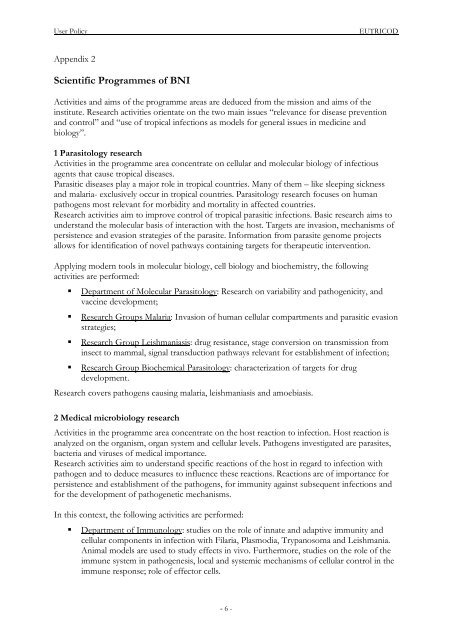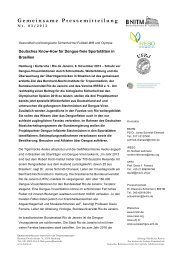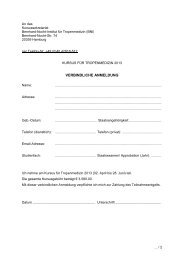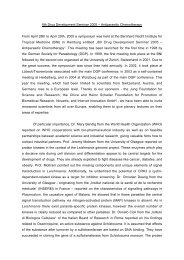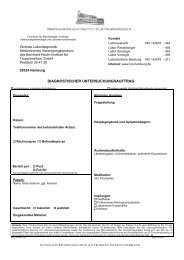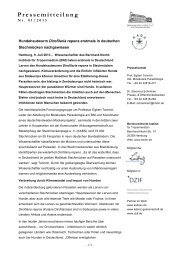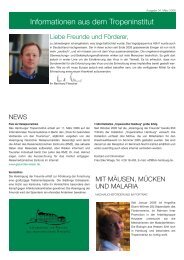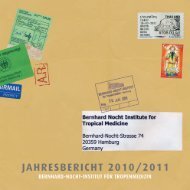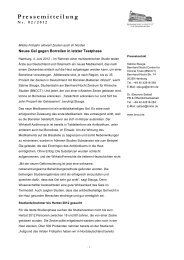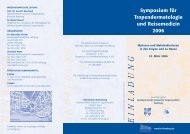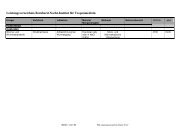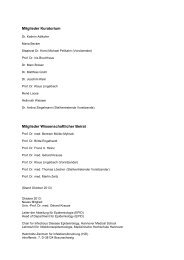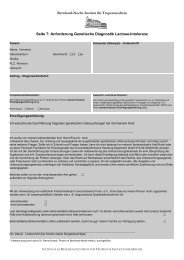EUTRICOD User Policy - Bernhard-Nocht-Institut für Tropenmedizin
EUTRICOD User Policy - Bernhard-Nocht-Institut für Tropenmedizin
EUTRICOD User Policy - Bernhard-Nocht-Institut für Tropenmedizin
Create successful ePaper yourself
Turn your PDF publications into a flip-book with our unique Google optimized e-Paper software.
<strong>User</strong> <strong>Policy</strong><br />
<strong>EUTRICOD</strong><br />
Appendix 2<br />
Scientific Programmes of BNI<br />
Activities and aims of the programme areas are deduced from the mission and aims of the<br />
institute. Research activities orientate on the two main issues “relevance for disease prevention<br />
and control” and “use of tropical infections as models for general issues in medicine and<br />
biology”.<br />
1 Parasitology research<br />
Activities in the programme area concentrate on cellular and molecular biology of infectious<br />
agents that cause tropical diseases.<br />
Parasitic diseases play a major role in tropical countries. Many of them – like sleeping sickness<br />
and malaria- exclusively occur in tropical countries. Parasitology research focuses on human<br />
pathogens most relevant for morbidity and mortality in affected countries.<br />
Research activities aim to improve control of tropical parasitic infections. Basic research aims to<br />
understand the molecular basis of interaction with the host. Targets are invasion, mechanisms of<br />
persistence and evasion strategies of the parasite. Information from parasite genome projects<br />
allows for identification of novel pathways containing targets for therapeutic intervention.<br />
Applying modern tools in molecular biology, cell biology and biochemistry, the following<br />
activities are performed:<br />
<br />
<br />
<br />
<br />
Department of Molecular Parasitology: Research on variability and pathogenicity, and<br />
vaccine development;<br />
Research Groups Malaria: Invasion of human cellular compartments and parasitic evasion<br />
strategies;<br />
Research Group Leishmaniasis: drug resistance, stage conversion on transmission from<br />
insect to mammal, signal transduction pathways relevant for establishment of infection;<br />
Research Group Biochemical Parasitology: characterization of targets for drug<br />
development.<br />
Research covers pathogens causing malaria, leishmaniasis and amoebiasis.<br />
2 Medical microbiology research<br />
Activities in the programme area concentrate on the host reaction to infection. Host reaction is<br />
analyzed on the organism, organ system and cellular levels. Pathogens investigated are parasites,<br />
bacteria and viruses of medical importance.<br />
Research activities aim to understand specific reactions of the host in regard to infection with<br />
pathogen and to deduce measures to influence these reactions. Reactions are of importance for<br />
persistence and establishment of the pathogens, for immunity against subsequent infections and<br />
for the development of pathogenetic mechanisms.<br />
In this context, the following activities are performed:<br />
<br />
Department of Immunology: studies on the role of innate and adaptive immunity and<br />
cellular components in infection with Filaria, Plasmodia, Trypanosoma and Leishmania.<br />
Animal models are used to study effects in vivo. Furthermore, studies on the role of the<br />
immune system in pathogenesis, local and systemic mechanisms of cellular control in the<br />
immune response; role of effector cells.<br />
- 6 -


